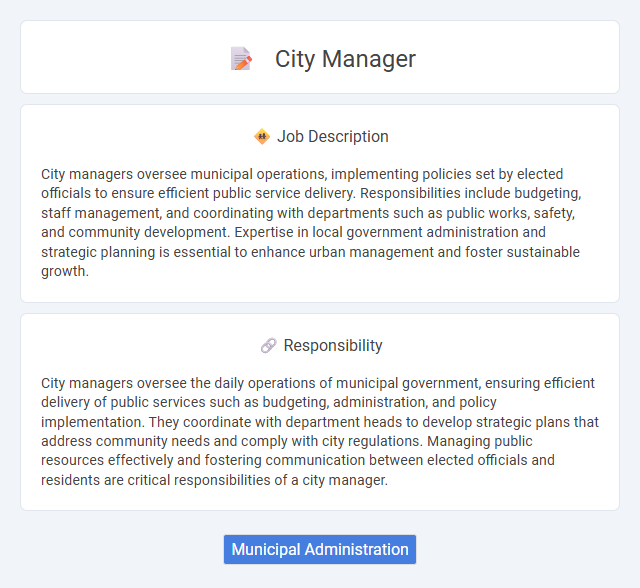
City managers oversee municipal operations, implementing policies set by elected officials to ensure efficient public service delivery. Responsibilities include budgeting, staff management, and coordinating with departments such as public works, safety, and community development. Expertise in local government administration and strategic planning is essential to enhance urban management and foster sustainable growth.
Individuals who demonstrate strong leadership skills and a capacity for strategic decision-making are likely to be well-suited for the city manager role. Those comfortable navigating complex governmental structures and addressing diverse community needs may find this position fulfilling. Candidates who thrive in high-pressure environments and possess excellent communication abilities have a higher probability of success in managing city operations effectively.
Qualification
City managers typically require a bachelor's degree in public administration, political science, or a related field, with many positions favoring candidates holding a master's degree in public administration (MPA) or business administration (MBA). Proven experience in municipal government, finance, budgeting, and strategic planning is essential to manage city operations effectively. Strong leadership, communication, and problem-solving skills are critical for coordinating departments and executing policies that meet community needs.
Responsibility
City managers oversee the daily operations of municipal government, ensuring efficient delivery of public services such as budgeting, administration, and policy implementation. They coordinate with department heads to develop strategic plans that address community needs and comply with city regulations. Managing public resources effectively and fostering communication between elected officials and residents are critical responsibilities of a city manager.
Benefit
City manager positions likely offer significant benefits such as competitive salaries, comprehensive health insurance, and retirement plans. Employees may also receive opportunities for professional development and job stability in local government. These benefits probably contribute to attracting skilled candidates dedicated to public service and community improvement.
Challenge
City manager roles likely involve navigating complex administrative challenges, including budget constraints, public policy implementation, and stakeholder management. The position probably demands balancing competing interests while ensuring efficient municipal services and responding to community needs. There is a strong probability that problem-solving skills and adaptability are essential to address unexpected crises and long-term urban planning issues.
Career Advancement
City manager positions offer significant potential for career advancement through gaining experience in municipal leadership and public administration. Professionals in this role often progress to higher executive roles such as county administrator, regional director, or policy advisor by demonstrating strong skills in budget management, urban planning, and stakeholder engagement. Continuous professional development, including certifications like ICMA Credentialed Manager, enhances promotion opportunities within government agencies and beyond.
Key Terms
Municipal Administration
City managers oversee municipal administration, ensuring efficient implementation of city policies and services. They coordinate departments such as public works, finance, and community development to maintain operational effectiveness and adherence to local government regulations. Their role involves strategic planning, budget management, and fostering collaboration between elected officials and city staff to promote sustainable urban growth.
 kuljobs.com
kuljobs.com